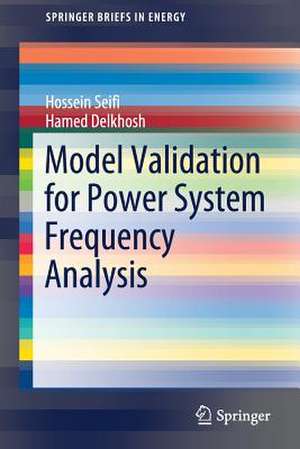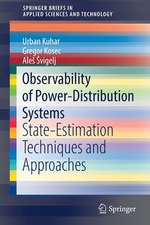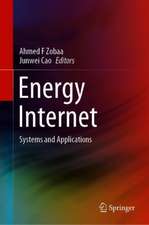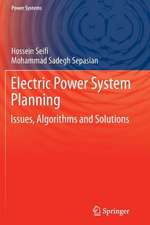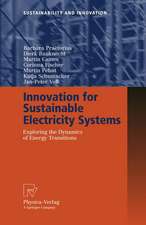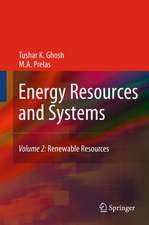Model Validation for Power System Frequency Analysis: SpringerBriefs in Energy
Autor Hossein Seifi, Hamed Delkhoshen Limba Engleză Paperback – 20 oct 2018
Din seria SpringerBriefs in Energy
-
 Preț: 345.89 lei
Preț: 345.89 lei -
 Preț: 345.89 lei
Preț: 345.89 lei -
 Preț: 376.04 lei
Preț: 376.04 lei -
 Preț: 377.35 lei
Preț: 377.35 lei -
 Preț: 476.42 lei
Preț: 476.42 lei -
 Preț: 343.36 lei
Preț: 343.36 lei -
 Preț: 374.85 lei
Preț: 374.85 lei -
 Preț: 376.59 lei
Preț: 376.59 lei -
 Preț: 477.72 lei
Preț: 477.72 lei -
 Preț: 176.35 lei
Preț: 176.35 lei -
 Preț: 380.07 lei
Preț: 380.07 lei -
 Preț: 376.22 lei
Preț: 376.22 lei -
 Preț: 377.95 lei
Preț: 377.95 lei -
 Preț: 376.43 lei
Preț: 376.43 lei -
 Preț: 377.73 lei
Preț: 377.73 lei -
 Preț: 343.00 lei
Preț: 343.00 lei -
 Preț: 377.35 lei
Preț: 377.35 lei -
 Preț: 377.95 lei
Preț: 377.95 lei -
 Preț: 444.35 lei
Preț: 444.35 lei -
 Preț: 348.84 lei
Preț: 348.84 lei -
 Preț: 412.30 lei
Preț: 412.30 lei -
 Preț: 377.73 lei
Preț: 377.73 lei -
 Preț: 375.62 lei
Preț: 375.62 lei -
 Preț: 380.07 lei
Preț: 380.07 lei -
 Preț: 376.80 lei
Preț: 376.80 lei -
 Preț: 376.22 lei
Preț: 376.22 lei -
 Preț: 479.67 lei
Preț: 479.67 lei - 15%
 Preț: 463.85 lei
Preț: 463.85 lei -
 Preț: 476.79 lei
Preț: 476.79 lei -
 Preț: 375.23 lei
Preț: 375.23 lei -
 Preț: 379.09 lei
Preț: 379.09 lei -
 Preț: 376.22 lei
Preț: 376.22 lei -
 Preț: 409.43 lei
Preț: 409.43 lei - 15%
 Preț: 462.38 lei
Preț: 462.38 lei -
 Preț: 414.21 lei
Preț: 414.21 lei -
 Preț: 375.62 lei
Preț: 375.62 lei -
 Preț: 374.30 lei
Preț: 374.30 lei -
 Preț: 376.22 lei
Preț: 376.22 lei - 15%
 Preț: 463.35 lei
Preț: 463.35 lei -
 Preț: 381.72 lei
Preț: 381.72 lei -
 Preț: 379.09 lei
Preț: 379.09 lei - 15%
 Preț: 463.35 lei
Preț: 463.35 lei -
 Preț: 376.80 lei
Preț: 376.80 lei -
 Preț: 374.46 lei
Preț: 374.46 lei -
 Preț: 477.56 lei
Preț: 477.56 lei -
 Preț: 379.48 lei
Preț: 379.48 lei -
 Preț: 374.30 lei
Preț: 374.30 lei -
 Preț: 479.47 lei
Preț: 479.47 lei -
 Preț: 378.12 lei
Preț: 378.12 lei
Preț: 375.62 lei
Nou
Puncte Express: 563
Preț estimativ în valută:
71.87€ • 75.05$ • 59.35£
71.87€ • 75.05$ • 59.35£
Carte tipărită la comandă
Livrare economică 15-29 aprilie
Preluare comenzi: 021 569.72.76
Specificații
ISBN-13: 9789811329791
ISBN-10: 9811329796
Pagini: 70
Ilustrații: VIII, 70 p. 30 illus., 19 illus. in color.
Dimensiuni: 155 x 235 mm
Greutate: 0.12 kg
Ediția:1st ed. 2019
Editura: Springer Nature Singapore
Colecția Springer
Seria SpringerBriefs in Energy
Locul publicării:Singapore, Singapore
ISBN-10: 9811329796
Pagini: 70
Ilustrații: VIII, 70 p. 30 illus., 19 illus. in color.
Dimensiuni: 155 x 235 mm
Greutate: 0.12 kg
Ediția:1st ed. 2019
Editura: Springer Nature Singapore
Colecția Springer
Seria SpringerBriefs in Energy
Locul publicării:Singapore, Singapore
Cuprins
Introduction.- Frequency Control.- Validation Framework for The Power System Frequency.- Frequency Validation for The Iranian Power Grid.- Identifying Influential Parameters on The Power System Frequency.
Notă biografică
Hossein Seifi was born in Shiraz, Iran (1957. He received his B.Sc. from Shiraz University in 1980, and his M.Sc. and Ph.D. from UMIST (U.K.) in 1987 and 1989, respectively. Since 1989, he has been with the TMU (Tarbiat Modares University) in Tehran where he is currently a Full Professor. He has had major contribution in developing the first postgraduate studies in Iran and supervising M.Sc. and Ph.D. students, while also holding positions such as Head of Faculty of Engineering and Vice-chancellor in Research Affairs at the University. He is the founder and also the Head of the Iran Power System Engineering Research Center (IPSERC), which is actively involved in strategic studies for the Iranian power grid, and has completed over 80 such studies over the last 15 years. He is the main author of the book “Electric Power System Planning, Issues, Algorithms and Solutions”, published by Springer in 2011 and used worldwide as a textbook for postgraduate students,as well as for experts in electric utilities. His research interests include electricity planning, and the operation and dynamics of power systems.
Hamed Delkhosh was born in Rasht, Iran, in 1991. He ranked highly in the Iranian nation-wide Ph.D. (2015), M.Sc. (2013), and B.Sc. (2009) university entrance exams, and completed his B.Sc. in Electrical Engineering, specializing in power systems (ranked in the top 20%) at Amirkabir University of Technology (AUT), Tehran, in 2013. He received his M.Sc. degree from Sharif University of Technology, Tehran, in September 2015 (ranked in the top 10%). Currently, he is a Ph.D. student in the Faculty of Electrical and Computer Engineering at Tarbiat Modares University (TMU), Tehran, in the field of power systems under the supervision of Professor H. Seifi. At the same time, he is also a researcher and project manager at the Iran Power System Engineering Research Center (IPSERC), which is affiliated to Tarbiat Modares Universityand is highly active in strategic studies for the Iranian power grid. His research interests are power system operation and dynamics and also renewable energies.
Hamed Delkhosh was born in Rasht, Iran, in 1991. He ranked highly in the Iranian nation-wide Ph.D. (2015), M.Sc. (2013), and B.Sc. (2009) university entrance exams, and completed his B.Sc. in Electrical Engineering, specializing in power systems (ranked in the top 20%) at Amirkabir University of Technology (AUT), Tehran, in 2013. He received his M.Sc. degree from Sharif University of Technology, Tehran, in September 2015 (ranked in the top 10%). Currently, he is a Ph.D. student in the Faculty of Electrical and Computer Engineering at Tarbiat Modares University (TMU), Tehran, in the field of power systems under the supervision of Professor H. Seifi. At the same time, he is also a researcher and project manager at the Iran Power System Engineering Research Center (IPSERC), which is affiliated to Tarbiat Modares Universityand is highly active in strategic studies for the Iranian power grid. His research interests are power system operation and dynamics and also renewable energies.
Caracteristici
Summarizes the latest studies in model validation of power system planning and operation to optimize performance in terms of frequency control Includes the detailed model validation for the Iranian Power Grid, describing a generalized framework for model validation with a real case study Offers step-by-step procedures for performing model validation, which can also be implemented in other power systems
